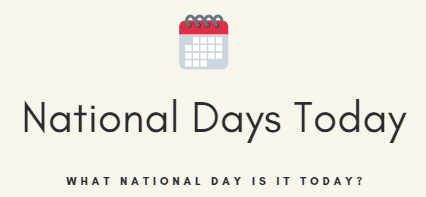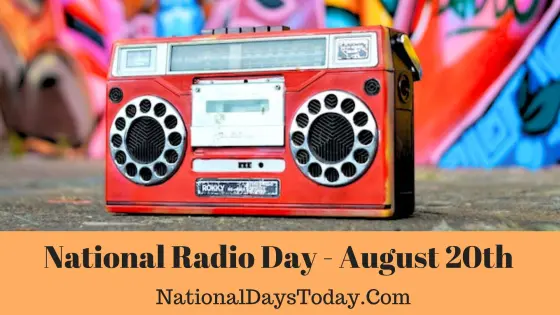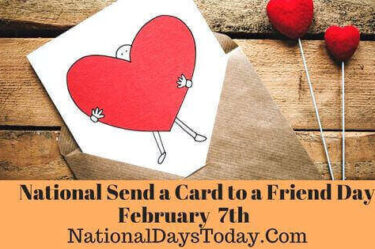National Radio Day
National Radio Day:
National Radio Day is observed on August 20th and honours one of humankind’s greatest achievements. The day has Over the majority of the past several years, millions of homes have benefited from the radio’s ability to deliver news and information.
| Year | Date | Day | Where |
| 2023 | 20th August | Sunday | United States |
| 2023 | 20th August | Tuesday | United States |
| 2025 | 20th August | Wednesday | United States |
Twitter Hashtags:
#NationalRadioDay
#RadioDay
Related: Other National Days Celebrated on August 20th
National Chocolate Pecan Pie Day
Why National Radio Day?
One of the greatest technologies ever made, radio was employed by both governments and troops for a variety of objectives, including information exchange and communication. It improved access to music and the media while bringing the world and our nation closer together. The radio was created by a team of researchers from around the world, therefore no one person can take entire credit for its invention. Finding every single radio component, including radio waves, electromagnetic induction, and electric conduction, took a long time.
In addition to providing us with entertainment by playing music and providing the news, the radio is a highly helpful tool for navigation for pilots and ship captains as well as for the military and law enforcement. Because of the growth of television and online streaming services, radio has been less popular over time. Spend the day listening to the radio to show your support and appreciation for your favourite radio station encourage others to adopt your strategy.
Interesting Facts About Radio Day:
- – The impact of radio is amplified over other media. When integrated with other media, including digital media like radio, the results are significantly enhanced. Our Media Marketing Sales Representatives’ integration of broadcast and digital plans for your company is primarily motivated by this.
- – Ownership of radios increased. In 1931, there was a radio in two out of every five homes. In 1938, 4/5 of people in the country had a radio.
- – More than 15,000 licenced broadcast radio stations were in operation in the US as of the end of 2012, according to FCC data.
- – The initial satellite radio broadcast occurred on October 1st, 1999. The transmission might be seen throughout Africa in Worldspace.
- – In India, there are over 479 radio stations operated by All India Radio, one of the biggest broadcasters in the world. It covers 99.19% of Indians, the bulk of the population.
How Can We Observe National Radio Day:
● Supporting Radio stations
Consider making a donation to a nearby radio station in observance of National Radio Day. It would be wonderful to take part in one of these stations’ yearly or biannual financing drives because it helps to keep their programming on the broadcast.
● Participate in an event
Participate in a regional commemoration of Day. Unless you didn’t locate one, host one yourself and encourage local stations to participate.
● Spreading advantages of radio
Speaking engagements, participation in productive discussions, and spreading knowledge about the advantages of radio as a communication tool are all ways that people mark this day.
History:
Since the early 1990s, National Radio Day has been observed in the United States and other countries. Some sources claim that the date of August 20 was chosen in honour of the day in 1920 when Detroit radio station 8MK (now WWJ) made its first transmission, despite the fact that this station wasn’t the first to broadcast in the US on that day.
In the late 1800s, several inventors worked together to create the radio. It’s interesting to note that a number of people can be credited with creating it. Each piece was instead created using research and creative thinking. The radio was made possible by the fusion of these two technologies. Heinrich Hertz, a German physicist, was the first to recognise radio waves in 1886. Yet, thanks to the efforts of Italian inventor Gulielmo Marconi, it took around three decades until a practical receiver was produced.
Even though everything began with a Morse code message sent over a one-kilometer distance, Marconi paved the path for the types of messages that radio waves could transmit in the future. About 20 years after it first saw commercial use in the early 1900s, radio had attained such a level of popularity that people were lining up to buy them for their homes.
Regular public service activities were also offered through radio. Similar to a telegraph, the wireless technology sent information using dots and dashes. Also, it provided support in a crisis. The Titanic’s distress call was transmitted in 1912 with a Marconi radio.
The first radio programme with voice and music meant exclusively for entertainment was produced and broadcast by Reginald Fessenden in 1906. He made the show available to everyone by broadcasting it from Brant Rock, Massachusetts. The physicist, who was born in Canada, would go on to win a great deal more battles in his lifetime. When National Public Radio promoted the day in 2011, its popularity skyrocketed. This day is now recognised on a widespread basis.


